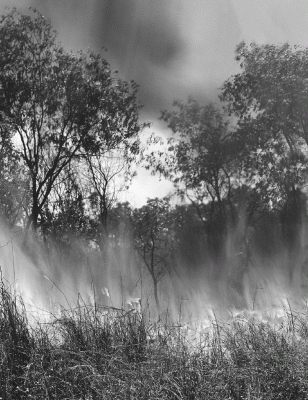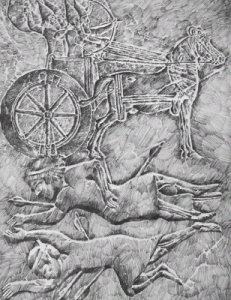Nahum
To date Nahum’s ministry, we have to look at the nature of his prophecy. The city-state of Ninevah had repented when Jonah prophesied agains them, but they had returned to wickedness. Nahum prophesies the city’s downfall, which occurred in 612 B.C. He refers to the destruction of the city of Thebes, which occurred in 663 B.C., so his ministry was between those dates.
Nahum was a poet who wrote in superb Hebrew. His book begins with an acrostic using the first fifteen letters of the Hebrew alphabet. He foresaw the downfall of Assyria, and knowing the destruction Assyria wreaked upon Israel, he must have been relieved at the justice of the Lord. As he foresees punishment for the Assyrians, he sees hope for Israel. There is prophetic dualism in the prediction of destruction for Assyria and the destruction of the wicked at the Second Coming of Jesus Christ.
“The final poem ( chapter 3 ) opens with a prelude on the evils of the oppressive city, Nineveh. Her lies, rape, and sorcery; her prey in thousands slain; her harlotry and witchcraft and the seduction of the nations all are told. Because of all this, the prophet says she shall become detestable ( verses 5–7 ). Like all others strong but wicked, Nineveh shall fall ( verses 8–11 ); all her defenses shall be useless when her leaders flee like locusts ( verses 12–17 ). Her end has come; there remains for the prophet but to write the epitaph” ( verses 18–19 ) (Ellis Rasmussen, “Nahum, a Poet-Prophet,” Instructor, Aug. 1962).
Zephaniah
 Zephaniah was probably a contemporary of Jeremiah, Nahum, and possibly Habakkuk. His preaching was during the advance of another enemy to Judah, the Scythians. “…he announced that these pitiless destroyers were Jehovah’s instrument of punishment, and the catastrophe that threatened His day of judgment” (J. R. Dummelow, ed., A Commentary on the Holy Bible, pp. 592–93.)
Zephaniah was probably a contemporary of Jeremiah, Nahum, and possibly Habakkuk. His preaching was during the advance of another enemy to Judah, the Scythians. “…he announced that these pitiless destroyers were Jehovah’s instrument of punishment, and the catastrophe that threatened His day of judgment” (J. R. Dummelow, ed., A Commentary on the Holy Bible, pp. 592–93.)
Zephaniah speaks of judgment in the general sense, and of the destruction of the wicked and redemption of the just at the Second Coming. Zephaniah was a contemporary of King Josiah of Judah, and he called the kingdom of Judah to repentance. Remember that Josiah was a good man who tried to undo the idol worship and wickedness bred by King Manasseh, but the people would not follow his example.
[Zephaniah] condemned many groups in Judah’s society, including the political leaders, the judges, the prophets, and the priests. Corruption was at every level. He stressed the constant righteousness and justice of the Lord, who continually brings down wicked people and nations. All hope was not to be lost, however, because there would still be a remnant with whom God could work and bring to pass His righteous purposes. In addition, there is always God’s unbounded mercy. The righteous in any age can take comfort in their righteousness.
Zephaniah ended with a note of hope, with the final regathering and rebirth of Israel as an holy nation.
Habakkuk
Habakkuk represents the people questioning the Lord. He wonders over the Lord’s seeming indifference to the plight of the people. The Lord answers that He is about to execute judgment through the wicked Chaldeans. But, says Habakkuk, the Chaldeans are the more wicked. The Lord answers that they, too, will be destroyed.
 Scholars believe that Habakkuk lived in Jerusalem, a contemporary of Jeremiah. Habakkuk 2 makes a distinction between the Chaldeans and the people of Judah. There is permanent protection and happiness promised to those who know and live by the laws of God. The Chaldeans may triumph for a little season, but if Judah will repent, they could be a blessed people forever.
Scholars believe that Habakkuk lived in Jerusalem, a contemporary of Jeremiah. Habakkuk 2 makes a distinction between the Chaldeans and the people of Judah. There is permanent protection and happiness promised to those who know and live by the laws of God. The Chaldeans may triumph for a little season, but if Judah will repent, they could be a blessed people forever.
Habakkuk finishes with a psalm of praise:
Yet I will rejoice in the Lord,
I will joy in the God of my salvation.
The Lord God is my strength,
and he will make my feet like hinds’ feet,
and he will make me to walk upon mine high places . . .*Parts of this article have been adapted from the LDS Institute Old Testament Manual
